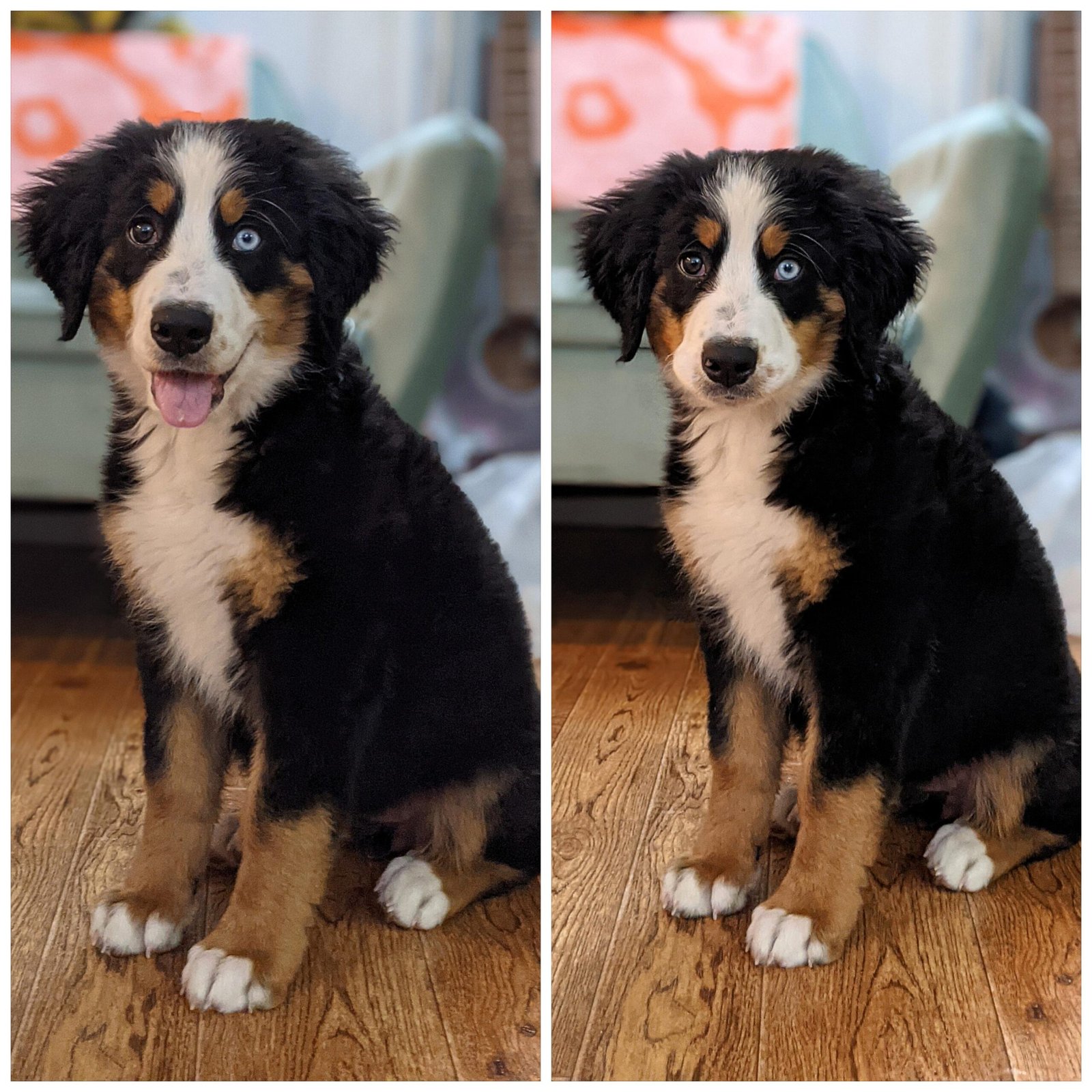Have you ever wondered if Bernese Mountain Dogs have blue eyes? Well, let’s dive right into the fascinating world of this beloved breed and find out!
Here’s the thing, when it comes to eye color, Bernese Mountain Dogs generally have dark brown eyes. It’s like looking into a pair of rich chocolate buttons! Their captivating gaze adds to their charm and gentle demeanor.
However, bear in mind that there can be exceptions. While blue eyes are not a common characteristic of Bernese Mountain Dogs, on rare occasions, you might come across an individual with beautiful pale blue eyes that seem to sparkle like sapphires. How enchanting is that?
So, if you’re dreaming of a Bernese Mountain Dog with striking blue eyes, keep in mind it’s not the norm. Nonetheless, their warm brown eyes will undoubtedly melt your heart and make you fall head over heels for these majestic dogs!

Do Bernese Mountain Dogs Have Blue Eyes?
When it comes to Bernese Mountain Dogs, one of the most striking features is their beautiful, expressive eyes. However, the question of whether Bernese Mountain Dogs have blue eyes is a common one. In this article, we will explore the eye color of Bernese Mountain Dogs and provide you with all the information you need to know. So, let’s dive in!
The Eye Colors of Bernese Mountain Dogs
As you may have already noticed, most Bernese Mountain Dogs have dark brown eyes. This is the most common eye color for the breed and gives them a soulful and gentle appearance. However, it’s important to note that not all Bernese Mountain Dogs have brown eyes. In fact, some individuals may have eyes that are a different color, including blue.
While blue eyes in Bernese Mountain Dogs are relatively rare, they do occur. It is a genetic variation that can be found in some individuals of the breed. Blue-eyed Bernese Mountain Dogs have a unique and captivating look that sets them apart from their brown-eyed counterparts.
It’s important to note that blue eyes in Bernese Mountain Dogs are not considered a breed standard. The Bernese Mountain Dog Club of America states that blue eyes are a fault and should be penalized in the show ring. However, this in no way diminishes the beauty and charm of a Bernese Mountain Dog with blue eyes. It simply means that for show purposes, brown eyes are preferred.
The Genetics Behind Eye Color in Bernese Mountain Dogs
The genetics behind eye color in Bernese Mountain Dogs is a fascinating topic. Eye color is determined by the presence of a specific gene called the “B locus.” This gene controls the production of pigment in the iris, which gives the eyes their color.
The brown eye color in Bernese Mountain Dogs is controlled by the dominant form of the B locus gene. This means that if a Bernese Mountain Dog inherits even one copy of the dominant gene, it will have brown eyes.
On the other hand, blue eyes in Bernese Mountain Dogs are the result of a recessive gene variant at the B locus. Both parents must carry and pass on this recessive gene for a Bernese Mountain Dog to have blue eyes. It’s worth noting that blue eyes can also occur in other breeds and mixed-breed dogs.
Blue Eyes vs. Brown Eyes in Bernese Mountain Dogs
While both blue and brown eyes are beautiful, some people may wonder if there are any differences or implications between the two. It’s important to understand that eye color does not affect a Bernese Mountain Dog’s health or temperament.
In terms of appearance, blue-eyed Bernese Mountain Dogs have a unique and striking look that can be quite captivating. Their eyes stand out and draw attention, making them even more irresistible to many dog lovers. On the other hand, brown-eyed Bernese Mountain Dogs have a warm and soulful expression that is equally charming.
Ultimately, whether a Bernese Mountain Dog has blue eyes or brown eyes, they are loving, loyal, and wonderful companions. Eye color should not be the sole factor in choosing a Bernese Mountain Dog, as temperament, health, and compatibility are much more important considerations.
Factors That Influence Eye Color
In addition to genetics, there are other factors that can influence the eye color of Bernese Mountain Dogs. It’s important to understand that eye color can change during a dog’s early development and may continue to evolve as they mature.
One common factor that can affect eye color is the presence of a white coat pattern. Some Bernese Mountain Dogs may have white markings on their face or body. White coat patterns are associated with a higher likelihood of blue eyes. However, it’s important to note that not all Bernese Mountain Dogs with white markings will have blue eyes.
Another factor that can influence eye color is age. Puppies are often born with blue eyes, which can change to their final color as they grow older. It’s not unusual for a Bernese Mountain Dog puppy with blue eyes to eventually develop brown eyes. This is because the melanin levels in the iris increase as the puppy matures.
Tips for Taking Care of Your Bernese Mountain Dog’s Eyes
Regardless of eye color, it’s important to take proper care of your Bernese Mountain Dog’s eyes to ensure their overall health and well-being. Here are a few tips:
- Regularly check your dog’s eyes for any signs of redness, discharge, or swelling. If you notice any abnormalities, consult your veterinarian.
- Keep the area around your dog’s eyes clean by gently wiping away any dirt or debris.
- Protect your dog’s eyes from harsh sunlight or debris when in outdoor environments.
- Take your Bernese Mountain Dog for regular veterinary check-ups, including eye examinations.
- Consider using eye drops or ointments specifically formulated for dogs if recommended by your veterinarian.
By following these tips, you can help maintain your Bernese Mountain Dog’s eye health and ensure they live a happy and comfortable life.
In Conclusion
While blue eyes in Bernese Mountain Dogs are relatively rare and not considered a breed standard, they can occur due to genetic variations. Bernese Mountain Dogs with blue eyes have a unique and captivating appearance that sets them apart. However, eye color should not be the sole factor in choosing a Bernese Mountain Dog, as temperament, health, and compatibility are far more important considerations. Whether a Berner has blue eyes or brown eyes, they are loving and wonderful companions that bring joy to their families.
Key Takeaways: Do Bernese Mountain Dogs Have Blue Eyes
- Bernese Mountain Dogs usually do not have blue eyes.
- Their eye color is typically brown, ranging from light to dark shades.
- Blue eyes in Bernese Mountain Dogs are considered a rare occurrence.
- If a Bernese Mountain Dog has blue eyes, it is likely due to a genetic anomaly.
- Blue eyes in Bernese Mountain Dogs can be attributed to the presence of a specific gene.
Frequently Asked Questions
Bernese Mountain Dogs are known for their beautiful coat and friendly nature. While their eyes are usually brown, let’s explore some common questions related to their eye color.
1. Are Bernese Mountain Dogs born with blue eyes?
No, Bernese Mountain Dogs are not born with blue eyes. Like most dogs, they are usually born with blue eyes that eventually change to their true eye color around 6-8 weeks of age. Bernese Mountain Dogs typically have brown eyes, which is the most common eye color for this breed.
During their early weeks, their eye color may appear lighter or bluer due to the development of pigmentation. This is a normal part of their growth process, and their eye color will eventually settle into its permanent shade.
2. Can Bernese Mountain Dogs have blue eyes at any point in their lives?
While it is extremely rare, there have been cases where Bernese Mountain Dogs have blue eyes in adulthood. These instances usually occur due to a genetic variation, known as heterochromia. Heterochromia causes one or both eyes to have a different color from the typical brown shade.
However, it’s important to note that blue eyes are not a standard or desirable trait in Bernese Mountain Dogs according to breed standards. The majority of Bernese Mountain Dogs will have brown eyes throughout their lives.
3. Is blue-eyed Bernese Mountain Dog a separate breed?
No, a blue-eyed Bernese Mountain Dog is not a separate breed. The breed standard for Bernese Mountain Dogs does not include blue eyes as a characteristic trait. Typically, the breed standard calls for dark brown eyes to be one of the defining features of a Bernese Mountain Dog.
However, a blue-eyed Bernese Mountain Dog may still possess all the other standard physical traits and characteristics of the breed. The main difference is the eye color, which is not typical but can still occur due to genetic variations.
4. Can Bernese Mountain Dogs with blue eyes experience any vision problems?
Although Bernese Mountain Dogs with blue eyes might stand out, there is no evidence to suggest that they experience more vision problems compared to their brown-eyed counterparts. Eye color does not directly correlate with the overall health or visual acuity of a dog.
However, it’s essential to prioritize regular check-ups with a veterinarian to monitor and maintain the general health and well-being of any Bernese Mountain Dog, regardless of their eye color.
5. Are there any health concerns associated with blue-eyed Bernese Mountain Dogs?
Blue-eyed Bernese Mountain Dogs may not inherently have health concerns solely because of their eye color. It is crucial, however, to focus on the overall health of the dog rather than solely on eye color when considering any potential health concerns.
Like all Bernese Mountain Dogs, blue-eyed individuals are prone to certain breed-specific health issues, such as hip and elbow dysplasia or certain types of cancer. Regular vet check-ups, a balanced diet, exercise, and proper care are essential for maintaining the health and well-being of any Bernese Mountain Dog, regardless of eye color.
Summary
So, we’ve learned that Bernese Mountain Dogs can indeed have blue eyes, but it is quite rare. Most of them have brown eyes, which is more common in this breed. Some factors, like genetics and age, can influence their eye color. Blue eyes can be charming, but the most important thing is that our Bernese Mountain Dogs are healthy and happy!

